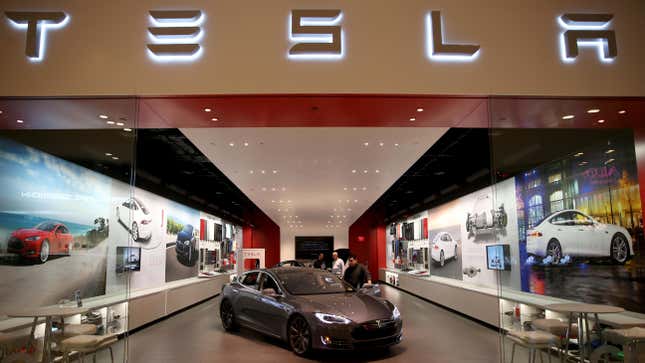
Tesla will have to recall 53,822 of its U.S. vehicles equipped with its Full Self Driving beta over concerns the software may encourage vehicles to engage in rolling stops at intersections. According to the recall, software functionality in FSD in some cases could allow vehicles to travel through intersections at up to 5.6 miles per hour without first coming to a full stop. Though Tesla hasn’t reported any crashes resulting from this “rolling stop” feature, the recall report warned the feature could “increase the risk of collision.” In a statement, National Highway Traffic Safety Administration told Gizmodo that Tesla will perform an over-the-air software update that will disable rolling stop functionality.
Tesla re-introduced rolling stops into FSD last month as an element of its driver profiles. Those profiles are separated into, “Chill” “Average” and “Assertive” modes, with the latter two options explicitly stating that they “may perform rolling stops.” Those profiles were met with confusion and skepticism when they were released, with some pointing out that these same types of rolling stops are generally illegal in the U.S.
“The Vehicle Safety Act prohibits manufacturers from selling vehicles with defects posing unreasonable risks to safety, including intentional design choices that are unsafe,” an NHTSA spokesperson told Gizmodo. “Following discussions with NHTSA about our concerns, Tesla has informed the agency that it will conduct a recall of the ‘Rolling Stop’ feature as one of the functionalities of the Driving Profile in its Full Self Driving software. In a new software update, a ‘Rolling Stop’ will no longer be possible.”
Gizmodo reached out to Tesla for comment but has not heard back. The most recent recall affects 2016-2022 Model S sedans and X SUVs, 2017 to 200 Model 3 sedan models, and 2020-2022 Model Y SUVs.
This marks Tesla’s third major recall in as many months. In December, the company was forced to recall 475,000 vehicles over camera and front trunk issues that were potentially dangerous. In the worst case, the camera issue associated with that recall could have prevented drivers from being able to access their rearview camera image, the NHTSA said at the time. Just a month before that, Tesla issued a recall affecting 11,704 vehicles over a software glitch in FSD. That glitch, in some cases, caused “false forward-collision warnings’’ or automatic braking, according to the recall. Unlike the December recall, Tesla was able to quickly resolve the FSD software malfunction through an over-the-air update.
Tesla has faced some other recent troubles as well. In November, the first major crash involving Tesla’s Full Self Driving beta may have also occurred in Brea, California. That crash drew renewed scrutiny of the feature’s safety standards. Then, a month later, the NHTS announced it had launched an investigation into Tesla’s Passenger Play, its in-car entertainment system that allowed some drivers to access games even while their vehicle was in motion. (Tesla has since said it would disable Passenger Play while vehicles were in motion).
Despite all of these hiccups, the EV maker still managed to end 2021 looking about as strong as ever. In what the company called a “breakthrough year,” Tesla saw its revenues increase 65% YOY according to its recent Q4 earnings report. In an earnings call, CEO Elon Musk said nearly 60,000 Tesla owners used FSD by the end of 2021 and said he would be “shocked” if the feature was not safer than a human driver by the end of 2022, Electrek notes.
Yet, there are signs of trouble brewing on the horizon. Shares of the company dropped last week after the company announced supply chain pains could force the company to limit production in 2022, Fortune notes.
“Our own factories have been running below capacity for several quarters as supply chain became the main limiting factor, which is likely to continue through 2022,” Tesla said in its recent earnings statement.
You can read the full recall report below.